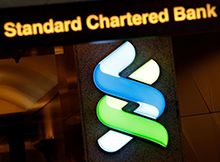Standard Chartered is hoping this weekend to finally shake off some of the painful and costly US regulatory shackles that have weighed on the British bank for the past six years.
Deferred prosecution agreements imposed by the US Department of Justice and New York regulators are due to expire on July 28, after twice being extended following their original implementation in 2012.
Standard Chartered was fined US$667m in 2012 by US authorities for breaking sanctions on Iran, Libya and other countries between 2001 to 2007.
The settlement included DPAs with the DoJ and the New York County District Attorney’s Office. In a DPA a prosecutor grants amnesty in exchange for the defendant agreeing to fulfil certain requirements. If a bank reoffends it could face prosecution and further fines related to the original crimes.
The DPAs were last extended on November 9, because the bank had not improved compliance standards to the satisfaction of US authorities.
Standard Chartered on Tuesday declined to comment on whether the DPAs are likely to expire or will be extended again.
Extra scrutiny from a DPA and having monitors installed can require a bank to have scores more compliance staff and add several hundred million dollars of annual costs, banking sources have previously told IFR.
Rival HSBC also had a lengthy DPA with the Department of Justice, which expired in December. It stemmed from HSBC’s lax anti-money laundering controls in Mexico between 2006 and 2008, when the bank failed to prevent hundreds of millions of dollars being laundered by drug cartels in the country. The bank paid a US$1.9bn fine and entered the five-year DPA in December 2012, which the US assistant attorney-general at the time said would act as a “sword of Damocles” over the bank. The end of the DPA was therefore seen as a success for HSBC’s efforts to improve its systems and compliance.
A number of conditions and obligations were also imposed for Standard Chartered to improve controls around sanctions and AML, including training, audit, disclosure and reporting requirements. It also included the appointment of an independent monitor. The obligations were managed under a programme called the US Supervisory Remediation Program to ensure compliance.
In December 2014 the DPAs were extended by three years as Standard Chartered was considered to have fallen short in some areas, and the monitor was retained. In November last year the bank said the DPA was extended again so it would end at the same time as the independent monitor’s oversight on July 28 this year.
